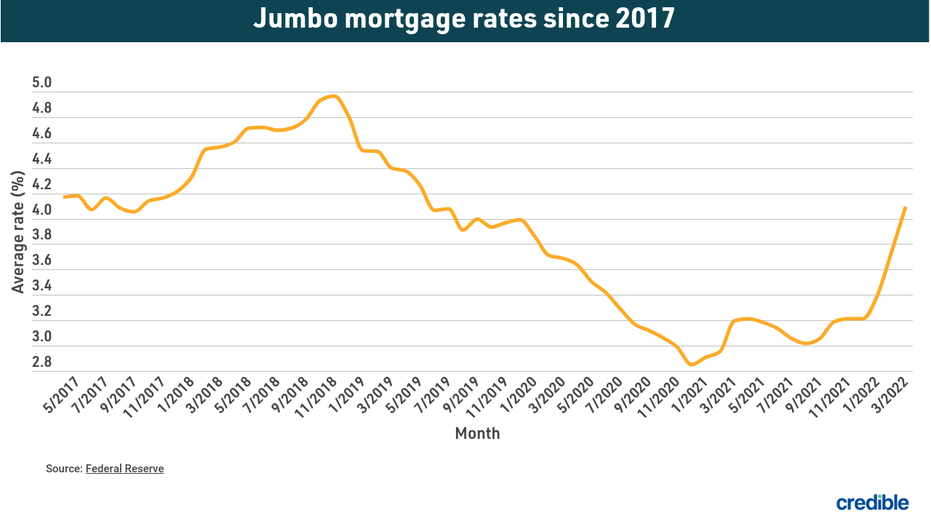Jumbo Loan: Open the Door to Luxury Living with Specialized Home Loan Options
Jumbo Loan: Open the Door to Luxury Living with Specialized Home Loan Options
Blog Article
Checking Out the Perks and Features of Jumbo Loans for Your Next Home Acquisition Choice
As the property market progresses, understanding the ins and outs of big car loans ends up being significantly significant for potential homebuyers considering high-value homes. These car loans not only facilitate significant funding yet also provide numerous advantages, such as competitive interest rates and the prospective removal of exclusive mortgage insurance. The path to securing a jumbo car loan is filled with specific qualification standards that might challenge some purchasers. To completely appreciate how big lendings can influence your home acquisition strategy, it is vital to explore their vital attributes and benefits in better information.
What Is a Jumbo Funding?

Jumbo finances are usually made use of by purchasers looking for to acquire high-value buildings or homes in costly markets. jumbo loan. Given the larger amounts obtained, lenders generally enforce stricter credit rating demands, including greater credit report, reduced debt-to-income proportions, and bigger down repayments. The passion rates on big fundings may be slightly greater than those on conforming lendings, reflecting the raised threat for lending institutions
In addition, the authorization process for a jumbo lending can be more lengthy and intricate, as lending institutions need considerable documentation to evaluate the borrower's monetary stability. Understanding these subtleties is necessary for potential homeowners thinking about a big car loan for their home funding demands.
Key Benefits of Jumbo Finances
One substantial advantage of big finances is their ability to fund higher-priced buildings that surpass adjusting car loan limitations. This function makes them an attractive choice for customers seeking to purchase high-end homes or residential properties in high-cost locations where rates typically exceed traditional finance limits.
Furthermore, jumbo loans usually feature versatile terms and affordable rate of interest, permitting customers to customize their financing to suit their distinct economic circumstances. jumbo loan. This flexibility can consist of alternatives for variable-rate mortgages (ARMs) or fixed-rate financings, offering purchasers with the ability to handle their regular monthly payments according to their preferences
Another benefit is that jumbo lendings do not require personal mortgage insurance (PMI), which can substantially minimize the total expense of the car loan. With PMI typically being a significant cost for standard car loans with low down payments, preventing it can cause substantial cost savings with time.
In addition, debtors of jumbo lendings usually have access to higher loan quantities, enabling them to spend in buildings that meet their lifestyle needs. This accessibility encourages purchasers to act decisively in affordable property markets, safeguarding their desired homes better. On the whole, jumbo fundings use vital advantages for those seeking to finance premium homes.
Eligibility Requirements for Jumbo Financings
Jumbo finances feature certain eligibility requirements that possible customers have to satisfy to secure financing for high-value residential properties. Unlike traditional lendings, which have set limitations based on the adjusting loan limitations established by government-sponsored entities, big lendings exceed these limits, requiring stricter criteria.

In addition, jumbo financings often require a considerable down settlement, frequently varying from 10% to 20% of the purchase price, depending on the lender's policies and the debtor's monetary circumstance. check my blog Meeting these eligibility demands can place debtors positively in protecting a big car loan for their preferred building.
Comparing Jumbo Finances to Traditional Lendings
Comprehending the differences in between conventional fundings and big financings is necessary for property buyers navigating the premium property market. Big fundings surpass the adhering finance limits set by the Federal Real Estate Money Agency (FHFA), which indicates they are not qualified for purchase by Fannie Mae or Freddie Mac. This causes different underwriting standards and requirements for borrowers.
In contrast, conventional loans commonly abide by these limits, enabling for a more structured authorization procedure. Jumbo financings frequently need more stringent credit history, larger down settlements, and higher monetary books. While a standard car loan may require a down settlement of as little as 3% to 5%, big lendings typically necessitate a minimum of 10% to 20%.
Interest rates on jumbo finances may vary from those of conventional lendings, often being slightly higher due to the raised threat loan providers presume - jumbo loan. Nonetheless, the capacity for considerable funding can be advantageous for purchasers seeking high-end residential or commercial properties. Ultimately, comprehending these differences makes it possible for property buyers to make informed choices, aligning their financing options with their one-of-a-kind buying requirements and monetary conditions
Tips for Safeguarding a Jumbo Car Loan
Securing a jumbo finance calls for careful planning and prep work, as loan providers frequently enforce more stringent requirements contrasted to conventional financings. To enhance your possibilities of authorization, start by checking your credit history and addressing any kind of concerns. A rating of 700 or higher is normally preferred, as it demonstrates credit reliability.
Next, collect your financial documentation, consisting of tax obligation returns, W-2s, and bank statements. Lenders typically need extensive evidence of earnings and possessions to analyze your capability to settle the car loan. Keeping a low debt-to-income (DTI) ratio is additionally crucial; go for a DTI listed below 43% to boost your application's competition.
Additionally, think about making a bigger down settlement. Numerous lending institutions look for at the very least 20% down for jumbo lendings, which not only lowers your financing amount however also signals financial stability. Involving with an experienced home loan broker can give important understandings into the procedure and help you browse numerous loan provider choices.

Final Thought
In summary, jumbo finances present considerable advantages for buyers seeking buildings that exceed conventional loan restrictions. Extensive understanding of both the requirements and benefits linked with get more jumbo finances is important for making notified home acquisition decisions in an affordable real estate market.
The rate of interest prices on jumbo car loans might be somewhat higher than those on adjusting loans, mirroring the enhanced risk for lenders.
While a traditional loan might need a down settlement of as little as 3% to 5%, jumbo financings typically demand a minimum of 10% to 20%.
Interest rates on big lendings may vary from those of traditional finances, often being slightly higher due to the increased danger lenders assume.Protecting a big lending calls for cautious planning and prep work, as lending institutions frequently impose more stringent needs contrasted to traditional loans. Several lending institutions seek at the very least 20% down for jumbo lendings, which not only reduces your financing quantity but click for info additionally signals economic stability.
Report this page